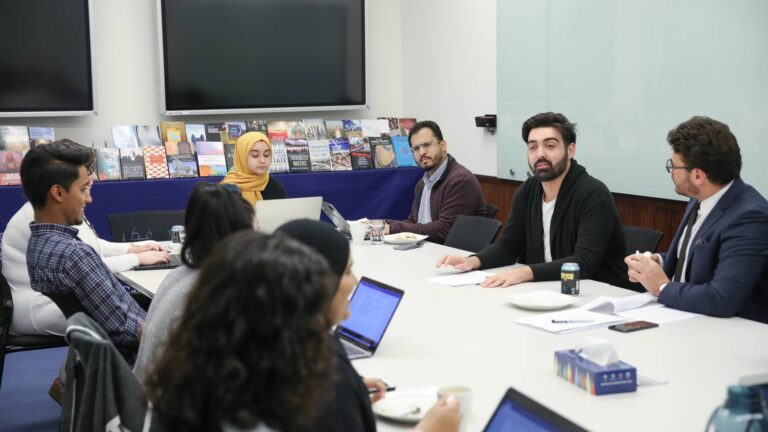American Studies, Race & Society, Regional Studies, Student Engagement
CURA Seminar: Science and Scientific Production in the Middle East

On March 14, 2019, the Center for International and Regional Studies (CIRS) held its second CURA Seminar for the 2018-2019 academic year. Coinciding with the second working group meeting on “Science and Scientific Production in the Middle East,” CURA fellows participated in the seminar discussing two submitted articles as part of the research initiative. Islam Hassan, CIRS Research Analyst, started the seminar welcoming the attendees and providing a brief overview of the research initiative then giving the floor to the CURA fellows to summarize and critique their assigned articles. Irakli Gobejishvili (class of 2022) and Khushboo Shah (class of 2022) served as presenters of the two articles, and Shaza Afifi (class of 2022), Khansa Maria (class of 2021), Riham Mansour (class of 2019), Abdul Rehmaan Qayyum (class of 2021), and Chaïmaa Benkermi (class of 2021) served as discussants.
Gobejishvili presented Tariq Dana’s paper titled: “A Cruel Innovation: Israeli Military and Security Production.” The paper studies the military-industrial complex in Israel as a field of technological advancement, a source of revenue, and as a “security apparatus.” The paper problematizes Israel’s arms trade with world regimes accused of committing atrocities, as the author claims.
Shah presented Abdelkader Djeflat’s paper titled: “Science, Technology and Socio-Economic Inequalities: What Inclusive Model for Arab Countries?” Throughout the different sections, the paper answers the questions: how have social inequalities hampered access to science and technology? How does the elitist access to science and technology work in the region? To what extent has the elitist access been obstructive to the advancement of science and technology? And how could we build a more inclusive and sustainable science, technology, and innovation (STI) system?
Subsequent to the paper presentations, the discussants kicked off the group discussion with their critique on the papers’ arguments and structure, and possible improvements. Two CURA research fellows, Ameena Almeer (class of 2020) and Irene Promodh (class of 2021), served as ambassadors to the Science and Scientific Production in the Middle East working group, and shared the comments and critique brought up at the CURA seminar.
- For the participants’ biographies, please click here
Article by Mohammed Al-Jaberi, CURA Publications Fellow